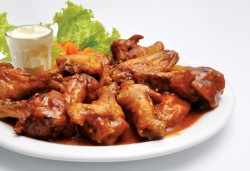BBQ rubs & sauces, when used properly, can greatly enhance the taste and texture of any food from the grill. Rubs are dry seasoning blends that have been formulated for a specific flavor combination, while sauces are liquid in form.
A Brief Introduction
Most meat rub blends have salt or sugar as their base, with one of those ingredients making up at least 50% of the blend. The rest of the ingredients can be any combination of a variety of seasonings. Typically the seasonings are of a bolder stripe because subtle seasonings are quickly lost in the rest of the overall flavor of the meat and rub.
Sauces are seasonings in liquid form. Because of their viscous properties, they posses a number of application advantages over rubs. Sauces can be applied before, during, or after cooking. Rubs are best applied before or sometimes during cooking. Many sauces can double as marinades. No matter when they are applied to your food, sauces infuse a high level of moisture. Most grilling sauces have mustard or vinegar as their base. Some are oil-based and a few are water- or mayonnaise-based.
BBQ Rubs & Sauces: Rubs
As mentioned above, BBQ rubs are seasoning blends. Nearly any seasoning blend will work on a large chunk of meat, but a common “country style” blend consists of 50% kosher salt, 25% brown sugar, 10% chili powder, and 5% each of garlic, onion, and cumin powder. Many variations of these ratios exist, but most revolve around these basic flavors. Cajun style rubs are very popular as well, typically employing a higher ratio of spicy ingredients.
An important consideration when applying rubs is how long your meat will be exposed to the rub before it is cooked. Because most rubs consist primarily of salt and sugar (two hydrophilic chemicals), when they are applied to meat they immediately go to work drawing out the moisture. This is a problem because we want the moisture to stay in the meat. After about 45 minutes the salt breaks down the meat tissue and the meat begins reabsorbing moisture, along with the flavor of the rub. For this reason, the key to applying rubs before cooking is to rub it at least 45 minutes in advance, and ideally even earlier than that. Larger cuts of meat benefit greatly from an overnight rub. This is sometimes called a “dry marinade.”
BBQ Rubs & Sauces: Sauces
Sauces come in a wide variety of styles and flavors. Their ingredient profiles are much more diverse than the profiles of rubs. Depending on their dominant ingredients, grilling sauces can be sweet, tangy, spicy, or acidic. The sweet and tangy sauces are typically characterized as “BBQ” sauces, and widely used on pork or beef barbecue. Mustard or a vinegar/tomato combination are generally the dominant flavors in such sauces. Spicy or acidic (citrus) sauces are more commonly used on chicken or seafood. The spicy flavor of hot sauces and the acidic bite of citrus sauces both complement the flavor of chicken very well. Citrus sauces also greatly enhance the flavor of fish or shrimp.